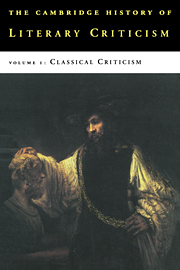Book contents
- Frontmatter
- 1 Early Greek views of poets and poetry
- 2 Language and meaning in archaic and classical Greece
- 3 Plato and poetry
- 4 Aristotle's poetics
- 5 The evolution of a theory of artistic prose
- 6 Hellenistic literary and philosophical scholarship
- 7 The growth of literature and criticism at Rome
- 8 Augustan Critics
- 9 Latin Criticism of the Early Empire
- 10 Greek Criticism of the Empire
- 11 Christianity and Criticism
- Bibliography
- Index
- References
6 - Hellenistic literary and philosophical scholarship
Published online by Cambridge University Press: 28 March 2008
- Frontmatter
- 1 Early Greek views of poets and poetry
- 2 Language and meaning in archaic and classical Greece
- 3 Plato and poetry
- 4 Aristotle's poetics
- 5 The evolution of a theory of artistic prose
- 6 Hellenistic literary and philosophical scholarship
- 7 The growth of literature and criticism at Rome
- 8 Augustan Critics
- 9 Latin Criticism of the Early Empire
- 10 Greek Criticism of the Empire
- 11 Christianity and Criticism
- Bibliography
- Index
- References
Summary
Philip of Macedon defeated the Greek city states at the Battle of Chaeronea in 338 BC. Though they retained some control of their internal affairs, their political importance largely comes to an end. Between 336 and 323 his son, Alexander the Great, extended the Macedonian empire beyond anything the world had seen through Asia Minor, Egypt, Mesopotamia, and into the Middle East, and with it the Greek language, education, literature, and religion. Under Alexander's successors, the political, commercial, and cultural centres within fifty years became Alexandria, the capital of Egypt, Pergamum in Asia Minor, and other eastern cities, though Athens remained the home of the philosophical schools established there in the fourth century: the Academy of Plato (which evolved into a school of scepticism); the Peripatetic School, founded by Aristotle; the Stoa of Zeno and his successors; and the Garden of the Epicureans. The emergence of the Hellenistic monarchies had an effect on literary life in that the focus of writers' attention was often drawn to the royal courts. The institution of patronage, important for early Greek poets but largely forgotten in Classical Athens, re-emerged and with it an impulse to flattery. A famous example is Callimachus' elegy on the apotheosis of the ‘Lock of Berenice’, Queen of Egypt, the ancestor of Pope's ‘Rape of the Lock’. For the history of criticism, the most striking developments are the establishment of the great Museum and Library at Alexandria, which became a centre for textual criticism and exegesis of texts based on literary, historical, biographical, and linguistic scholarship, and the phenomenon of Alexandrianism in poetic composition, which combined learning with artistic craftsmanship, often favouring the shorter poetic genres such as elegy, hymns, epigrams, and idylls.
- Type
- Chapter
- Information
- The Cambridge History of Literary Criticism , pp. 200 - 219Publisher: Cambridge University PressPrint publication year: 1990
References
- 1
- Cited by

